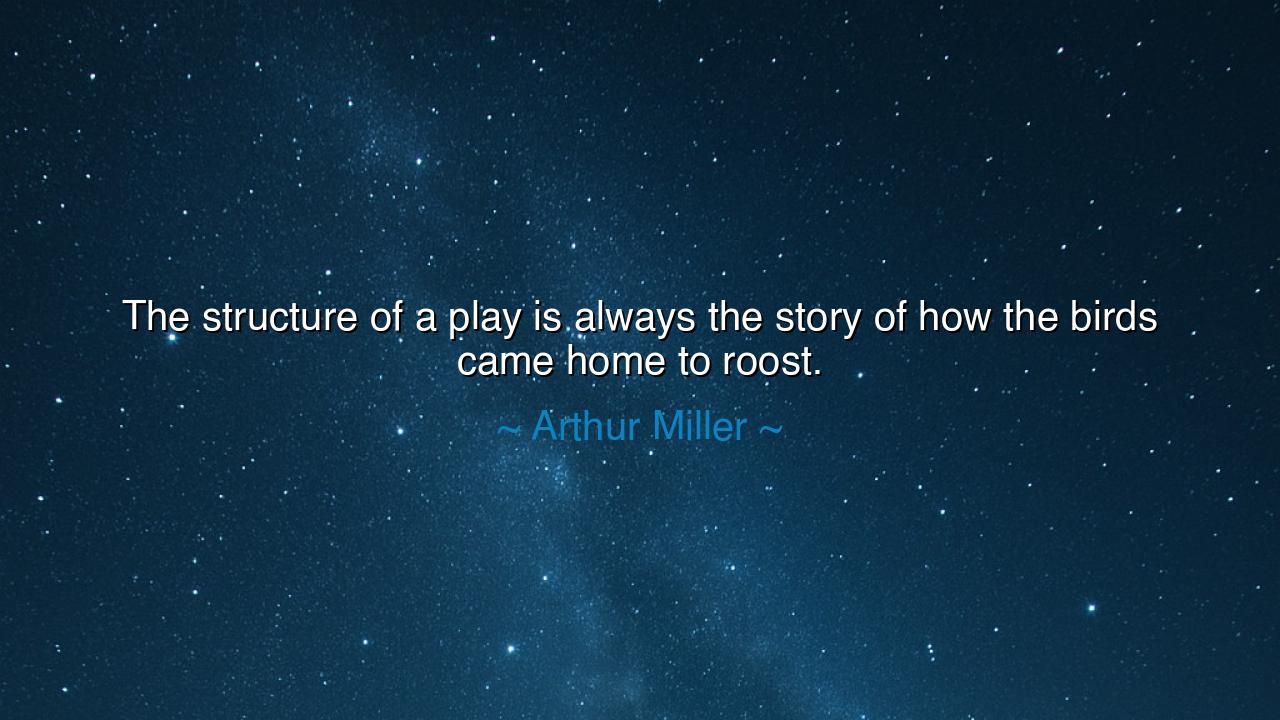
The structure of a play is always the story of how the birds came






In the profound and poetic words of Arthur Miller, the great dramatist of conscience, we find a truth that belongs not only to the theater but to the soul of human life itself: “The structure of a play is always the story of how the birds came home to roost.” With this, Miller reveals that every true drama—whether written on stage or lived in the heart—is a story of cause and consequence, of action and reckoning, of choices that return to claim their maker. Just as the birds that once flew free must one day find their way back to the nest, so too must the deeds of men return, bringing with them the weight of what was done and left undone.
Arthur Miller, born in an age of turmoil and raised amid the wreckage of the Great Depression, was no stranger to the moral storms that shape human destiny. His plays—"Death of a Salesman," "The Crucible," "All My Sons"—are built upon this very idea: that our actions, our lies, our ambitions, and our betrayals cannot fly forever beyond reach. They circle above us, silent and patient, until the moment they descend. Thus, when Miller speaks of the “birds coming home to roost,” he does not speak only of plot, but of justice, truth, and the inescapable rhythm of moral consequence. In every true story, as in life, the past is never dead—it merely waits for its hour of return.
In the ancient world, the same wisdom was told through myth. The Greeks, in their tragedies, understood that every act of pride and deceit sets in motion a chain of return. Consider Oedipus, who fled his fate only to run straight into it, or Agamemnon, who spilled blood abroad only to meet vengeance at home. These tales are the spiritual ancestors of Miller’s vision. They remind us that the structure of fate is not arbitrary—it is moral. What we send into the world—love or cruelty, truth or falsehood—will, in time, come back to us. The birds of our deeds will always find their way home.
Miller himself saw this pattern unfold in the crucible of his own century. In "The Crucible", he wrote of the Salem witch trials, but he was also writing of McCarthyism, when fear and false accusation tore through his own nation. The hysteria that America once unleashed returned to consume it—its birds came home to roost. Likewise, in "All My Sons," the story of a father who sells defective airplane parts to preserve his business, the truth he sought to bury returns in the most devastating way. The son he loves dies by the father’s own sin. Here, the structure of the play is the mirror of life itself: a circle that closes with justice, painful but inevitable.
Yet Miller’s insight is not one of despair—it is one of moral clarity. He reminds us that the drama of life is not shaped by accident, but by consequence. The universe, in its quiet and unyielding balance, is a stage where truth must eventually reveal itself. The playwright, like the philosopher, simply lays bare what has always been true: that there is no escaping the return of one’s actions. We are each authors of our own fate, and every word, every deed, every silence we craft will one day echo back upon us.
Think of Richard Nixon, whose secret manipulations during Watergate rose, like dark birds, to blot out the light of his presidency. Or think of empires, whose greed and oppression return as revolt and ruin. History itself is a grand theater where the same truth plays endlessly: the proud fall, the deceitful are exposed, the unjust are undone—not by chance, but by the return of what they themselves set in flight. So it is with every man, every family, every nation—their actions are the wings that will one day beat against their own windows.
And so, my children, remember this wisdom of Arthur Miller: that in every story, and in every life, there comes a reckoning. Live, therefore, with foresight and with conscience. Do not cast into the sky of the world what you would not wish to see return. For the words you speak, the choices you make, and the truths you bury will not remain forever aloft—they will circle back, sure as dawn follows dusk. Let your birds be good ones—let them be born of compassion, honesty, and courage—so that when they come home to roost, they bring you peace, not sorrow.
For in the end, this is the great and ancient law: all things return. And the measure of a life, like the structure of a play, is not in how it begins, but in how the truth finally lands upon the heart.






AAdministratorAdministrator
Welcome, honored guests. Please leave a comment, we will respond soon